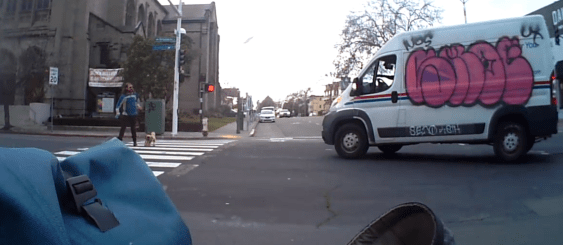Michael Andersen blogs for The Green Lane Project, a PeopleForBikes program that helps U.S. cities connect high-comfort biking networks.
The most interesting thing about this week's best bike infrastructure news isn't what's being built. It's how it's being built.
Two years ago, the sprawling Canadian prairie metropolis of Calgary decided to buck tradition and test an entire "minimum grid" of protected bike lanes through its downtown, all at once. Calgary's proposal survived a nailbiting 8-7 council vote thanks to a first-rate campaign by local advocates and the swing vote of a suburban conservative who said he'd simply been persuaded that for just $7 million, a quick-build biking network was worth a try.
It worked. Bike counts doubled almost immediately; at last count they're up 132 percent across downtown and biking is up citywide by every available measure, a win in Calgary's war on congestion.
On Monday, Edmonton proved how contagious a good idea can be.
Edmonton's council voted unanimously to do essentially the same thing, creating a connected system of comfortable bike routes in its downtown.
An overhead view of the post-protected bike lane planned for 102nd Avenue. Image: City of Edmonton.
"A new model of public consultation"
And intriguingly, Edmonton is also using what the Edmonton Journal calls a new way of improving streets – a "ready, fire, aim" approach that takes advantage of the fact that bike lanes, unlike freeways or railroads, can be tweaked after they're on the ground.
The cycle tracks will use a new model of public consultation – one that relies more on making it easier to fix mistakes, less on trying to predict them by showing detailed shop drawings to the public.
"Most of us aren’t good at looking at a rendering and knowing how that’s going to feel in the real world," said Coun. Scott McKeen, who represents the area.
Angry emails might start pouring in when construction starts. But that’s why these lanes are meant to be adaptable, McKeen said. They’ll be made with movable planters, bollards and concrete curbs. "We can lay it down, do at least a couple years trial, then if at the end … we see better solutions we can try that."
This is a fast-spreading approach to street design in the United States, too. In our recent report Quick Builds for Better Streets, we laid out nine ingredients for a city quick-build program.
The point of these programs isn't to avoid criticism – Edmonton will surely hear plenty once installation begins, alongside plenty of praise. But because the project will be built with flexible materials, the city will be able to respond and adjust to problems that arise. And in the meantime, it won't let itself be paralyzed by the fear of building an imperfect project.
No project is perfect. But the status quo isn't, either. Calgary's good idea, now expanded by Edmonton, is to start public conversation with the fact that some sort of change is needed, then to make those changes the best they can be.
Map at the top by Edmonton Journal.
The next phase of the Green Lane Project is the Big Jump Project, which will select 10 very different neighborhoods and districts and help them quickly connect biking networks. Find out how your city can apply here.






